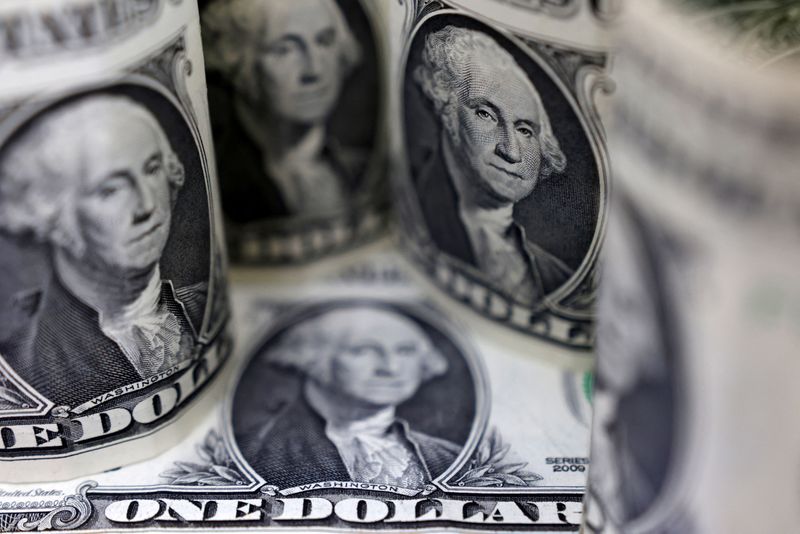 © Reuters. FILE PHOTO: U.S. Dollar banknotes are seen in this illustration taken July 17, 2022. REUTERS/Dado Ruvic/Illustration/File Photo
© Reuters. FILE PHOTO: U.S. Dollar banknotes are seen in this illustration taken July 17, 2022. REUTERS/Dado Ruvic/Illustration/File Photo
By Karen Brettell
NEW YORK (Reuters) - The dollar was steady against the euro on Wednesday and gained against the yen as it consolidated after a sharp selloff last week on rising confidence that the Federal Reserve has ended its interest rate-hiking cycle.
Traders also remained on alert for potential intervention in the Japanese currency as it rose above the 151 level against the dollar, its weakest level in a week.
Many economists and analysts expect the U.S. economy to slow in the fourth quarter, which makes further rate hikes less likely and will dent the appeal of the greenback, which has benefited from the relative strength of the United States compared to other major economies.
“The dollar is vulnerable to weaker data going forward," said Shaun Osborne, chief foreign exchange strategist at Scotiabank in Toronto. "We’re transitioning to a sort of sell dollar rallies environment, after the buy dollar dips trend that we’ve seen really since the middle of the year."
That said, the dollar may continue to gain in the short-term as it recovers from last week’s selloff, which was viewed by some as overdone.
“Essentially it’s a period of consolidation for the U.S. dollar generally... That probably will continue for a little bit longer,” said Osborne.
The greenback suffered after Fed Chair Jerome Powell was interpreted as striking a dovish tone at the conclusion of the Fed’s two-day meeting last Wednesday, when it left interest rates unchanged.
Powell did not comment on monetary policy in a speech on Wednesday. He is also due to speak on Thursday.
Futures point to a roughly 17% chance of another hike by January, but are pricing in an 18% chance that rate cuts could come as early as March, according to the CME FedWatch Tool.
The dollar index was last up 0.05% at 105.58. It fell 1.4% last week, its steepest weekly decline since mid-July.
Weaker-than-expected jobs data for October on Friday added to last week's selloff. The next major U.S. economic releases will be consumer price inflation and retail sales data due next week.
The euro edged up 0.02% to $1.0702.
The single currency was hurt earlier on Wednesday by data showing that retail sales in September fell 0.3% month-on-month in the bloc.
"The mixed outlook for consumer and investment spending leaves the euro zone very close to recession," said Wells Fargo Economist Nick Bennenbroek.
The dollar gained 0.41% to 151.03 Japanese yen, heading back towards levels that have investors on watch for currency intervention. It hit a one-year high of 151.74 last week.
"It's clear we are back in the intervention space," said ING FX strategist Francesco Pesole.
"The rate of change has been rather substantial in the last two sessions. If we see dollar-yen rising by another substantial amount today then intervention alarm bells will start ringing very loudly."
In the FX options market, however, positions are more tilted towards expectations that the yen will strengthen from here.
One-month dollar/yen risk reversals, which are used to gauge bullish or bearish sentiment in currency markets, on Wednesday showed a preponderance of puts -- a bet that the pair would fall -- over calls, currently at -0.65. That's the highest level since September 2022.
A negative risk reversal means the volatility of put options is greater than the volatility of similar call options.
The British pound, which earlier in the week hit a seven-week top against the dollar above $1.24, was last down 0.12% at $1.2283.
The Australian dollar fell another 0.57% to $0.6400, having slid 0.8% in the previous session - its largest daily decline in about a month.
The Reserve Bank of Australia (RBA) on Tuesday raised interest rates to a 12-year high, ending four months of steady policy, but watered down its tightening bias to make it more conditional on incoming data.
========================================================
Currency bid prices at 3:00PM (2000 GMT)
Description RIC Last U.S. Close Pct Change YTD Pct High Bid Low Bid
Previous Change
Session
Dollar index 105.5800 105.5400 +0.05% 2.020% +105.8700 +105.4400
Euro/Dollar $1.0702 $1.0700 +0.02% -0.12% +$1.0716 +$1.0660
Dollar/Yen 151.0300 150.4300 +0.41% +15.21% +151.0500 +150.3500
Euro/Yen 161.64 160.89 +0.47% +15.21% +161.6900 +160.7000
Dollar/Swiss 0.8998 0.8999 +0.00% -2.68% +0.9024 +0.8977
Sterling/Dollar $1.2283 $1.2299 -0.12% +1.58% +$1.2301 +$1.2243
Dollar/Canadian 1.3802 1.3767 +0.27% +1.88% +1.3814 +1.3755
Aussie/Dollar $0.6400 $0.6437 -0.57% -6.11% +$0.6449 +$0.6399
Euro/Swiss 0.9629 0.9630 -0.01% -2.69% +0.9634 +0.9597
Euro/Sterling 0.8711 0.8698 +0.15% -1.50% +0.8714 +0.8696
NZ $0.5909 $0.5935 -0.44% -6.94% +$0.5942 +$0.5908
Dollar/Dollar
Dollar/Norway 11.1930 11.2000 -0.11% +14.00% +11.2430 +11.1750
Euro/Norway 11.9809 11.9583 +0.19% +14.17% +12.0057 +11.9272
Dollar/Sweden 10.9044 10.9102 -0.17% +4.77% +10.9794 +10.8790
Euro/Sweden 11.6705 11.6899 -0.17% +4.67% +11.7092 +11.6516

